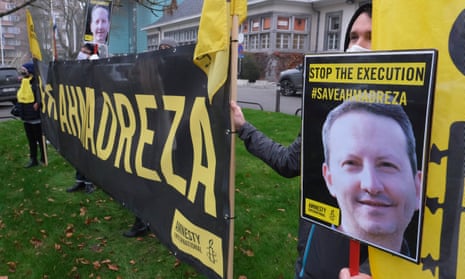A Swedish-Iranian scientist sentenced to death in Iran on espionage charges may face execution as early as Wednesday, human rights groups and his wife have warned.
Ahmadreza Djalali was due to be taken from Evin prison to Rajai Shahr prison on Tuesday, a normal preliminary to an execution. Death sentences in Iran are often carried out on Wednesdays.
It would be one of the first executions of a dual national held in Iran, and comes only a week after Iran released the British-Australian academic Kylie Moore-Gilbert in exchange for three Iranians accused of being part of a terror plot in Thailand.
The campaign group Iran Human Rights said: “Ahmadreza Djalali is at imminent risk of execution and only a strong and urgent reaction from the international community can save his life.”
The UN human rights rapporteur Agnés Callamard said: “The judge overseeing the arbitrary killing reportedly said the family would be granted a last-minute visit before his execution. Unconscionable. And unlawful. Human lives just pawns in international politics, tit for tat, no end in sight.”
Djalali’s wife, Vida Mehrannia, told the Guardian: “I spoke to him a week ago and what he said would happen is taking place. He will be executed at some point tomorrow, unless someone intervenes, I am not a political person, but all I can ask is that countries that have influence, maybe Austria and the US, will ask Iran to open his door and cancel his sentence. I hope the media will help me.
“I cannot tell my children what is happening these past four years or explain. How do I explain this?”
There was no official Iranian reaction to the reports, but the foreign ministry rejected suggestions earlier that it could intervene in cases of imprisoned dual nationals.
Sweden’s foreign minister, Ann Linde, said last week she had spoken to her Iranian counterpart, Javad Zarif, after reports Iran may soon carry out Djalali’s death sentence.
Djalali, a medical doctor and lecturer at the Karolinska Institute in the Swedish capital Stockholm, was arrested in Iran in 2016 and later convicted of espionage for Israel, having been accused of providing information to Israel to help it assassinate several senior nuclear scientists. His friends said he was forced into confessions.
Last month 153 Nobel laureates signed a letter addressed to Iran’s supreme leader, Ayatollah Ali Khamenei, asking for Djalali to be released.
Iran says all court procedures have been exhausted. The country’s supreme court in 2017 upheld the death sentence.
Rights activists have accused Iran of arresting a number of dual nationals to try to win concessions from other countries.
Djalali had travelled to Iran at the official invitation of the University of Tehran, but was arrested by intelligence ministry agents on 24 April 2016 and spent three months in the ministry’s detention centre.
There have been reports that Iran had been hoping to trade his reprieve for the release of the Iranian diplomat Assadollah Assadi, on trial in Belgium for allegedly taking part in a plot to explode a bomb at a rally of Iranian opposition figures in 2018. He is refusing to appear at the trial, claiming diplomatic immunity.
